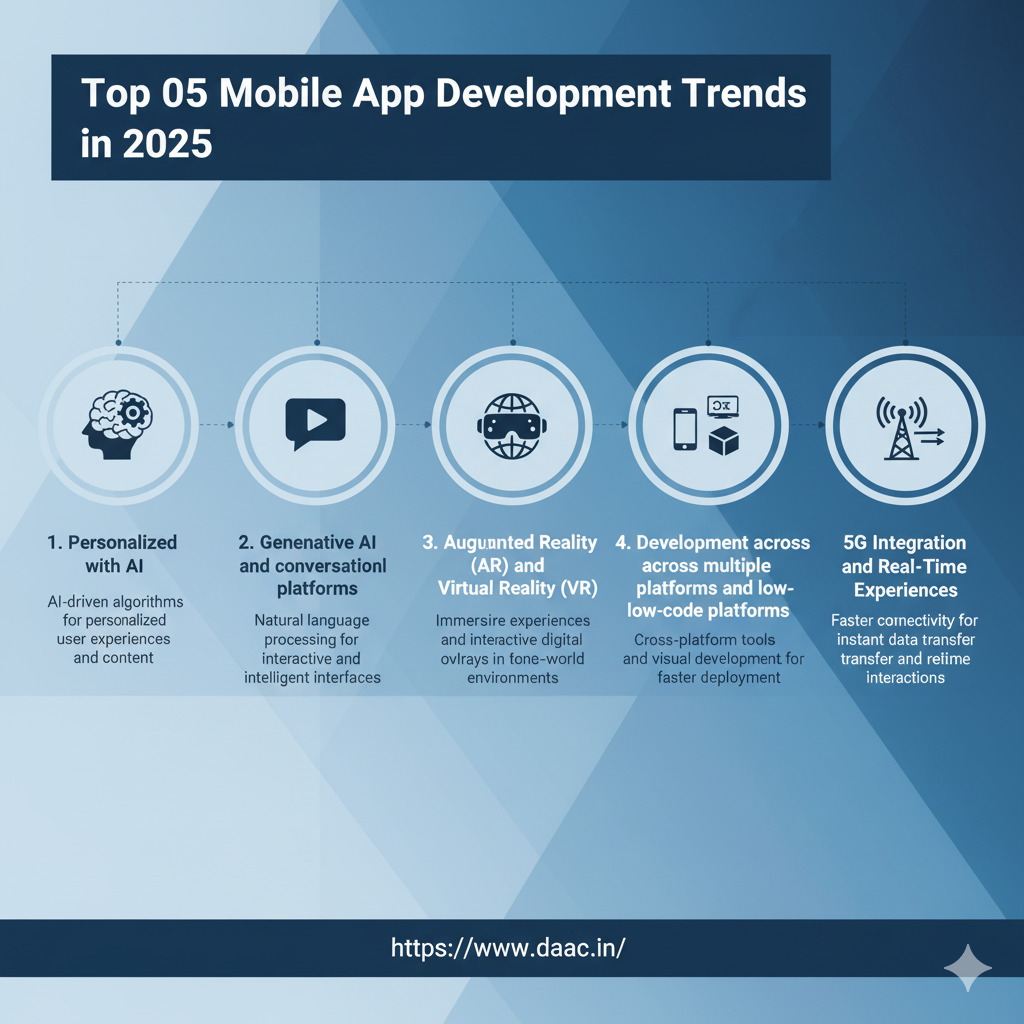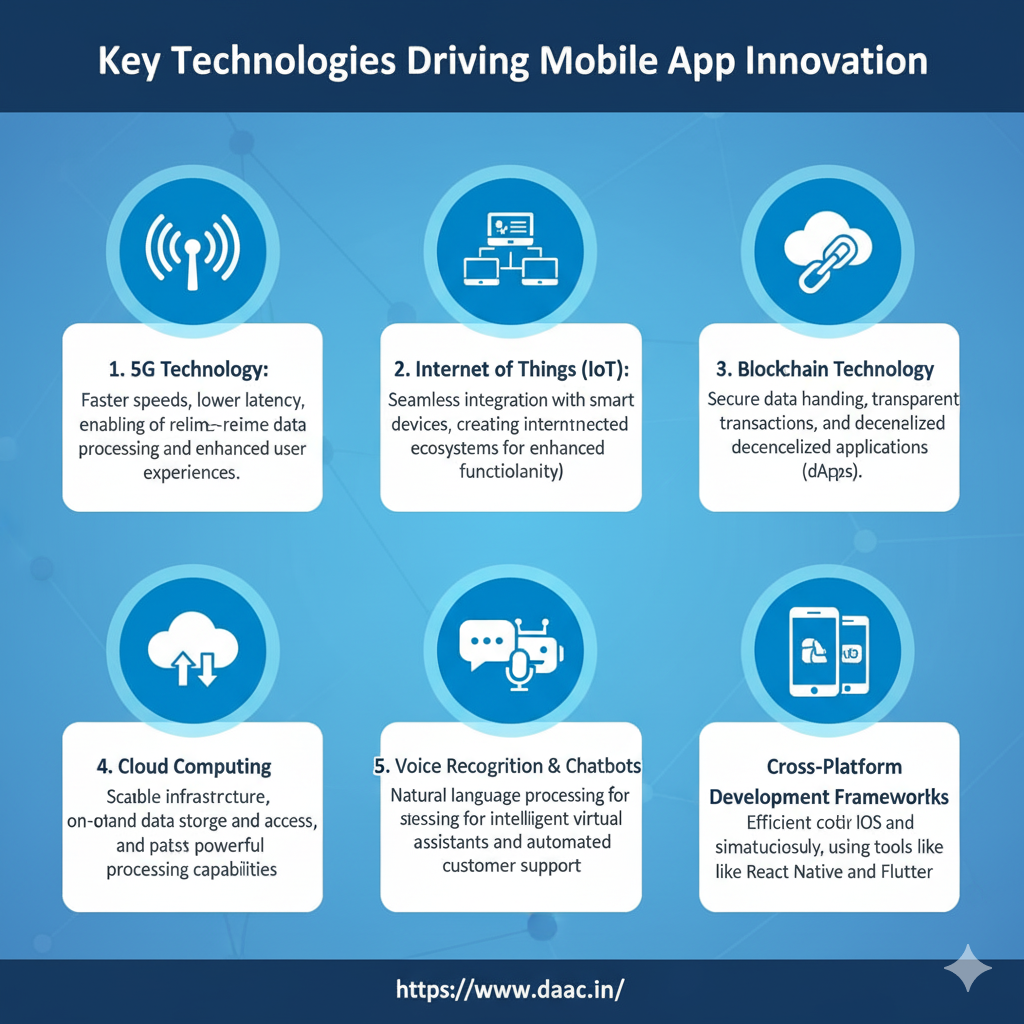Key Takeaways
In this article, You have know about the top 05 mobile app development trends in 2025. Check out for more information read this blog.
- AI and ML are reshaping applications by enabling personalized experiences and predicting the user behavior for more intelligent interactions.
- 5G and AR/VR are producing real-time immersive experiences, revolutionizing gaming, shopping, and enterprise training applications.
- Cross-platform tools and low-code platforms reduce time and costs and democratize application building.
- Mobile security, privacy, and compliance are imperative to uphold user trust and safeguard sensitive data.
- These trends present opportunities for businesses to innovate, grow, and remain competitive with rapidly changing application technology.
Market Analysis of Global Mobile App Development
- In 2023, the global mobile app market was valued at USD 252.89 billion, and it is projected to grow to USD 626.39 billion by 2030, at a CAGR of 14.3% from 2024 to 2030.
- Asia Pacific dominated the mobile app market, generating more than 32% of the industry’s total revenues in 2023, and this can be attributed to high levels of smartphone penetration, as well as increased internet usage.
- The market-leading mobile app was the Apple App Store, with more than 62.8% share of the market revenue in 2023, as developers and users were more inclined to accepting iOS applications.
- In terms of revenue share, gaming applications, which was the preferred mobile app segment, generated the highest revenue share of over 40% in the mobile app market in 2023.
- Increased consumer adoption of smartphones, an increase in internet usage, and technology integration, such as artificial intelligence and machine learning, are primarily driving demand for mobile applications.
Introduction of Mobile App Development Trend
Mobile App Development Trends: Developing mobile applications is the process of developing software applications for mobile devices using smartphones, tablets, etc. Mobile app development consists of coding, designing user-friendly applications, and putting in implementations that use items and device functions such as camera, GPS, and other sensors. With the expansion of tablets and smartphones, mobile applications have become an essential resource for businesses providing solutions to communicate, shop, entertain, and productively work and more. A standard mobile application has planning, design and coding, testing, and deployment to an Android or iOS platform to launch an app.
Top 05 Mobile App Development Trends in 2025
- Personalized with AI: Post placement of apps with AI integrations is turning mobile app experiences into intelligent contextual assistants. AI will apply predictive analytics and an adaptive UI/UX to revolutionize apps fueling alternate predictive capabilities to assess user requirements, customized content delivery, and/or automated processes. AI-present on-device processing through boundary-less short-cuts and processes will accomplish quicker response times and privacy.
- Generative AI and conversational platforms: OpenAI’s launch of a chat GPT app store is a significant new development. It’s now possible for developers to build third part apps to interact with GPT directly in a chat format for interactions with Spotify or Zillow for example.
- Augmented Reality (AR) and Virtual Reality (VR): AR and VR are on the verge of becoming typical options for any user-facing mobile app. The immersive experience that AR and VR can provide is capable of engaging users to a greater extent than existing options in gaming, retail, education, and health care. Also, because devices are becoming — and will continue to become – better, consumers will expect AR and VR to be options in mobile apps.
- Development across multiple platforms and low-code platforms: Platforms such as Flutter, React Native, and Jetpack Compose Multiplatform (from Google) allow developers to create code once and use it on Android, iOS, and the web. In addition, low-code/no-code platforms allow developers the ability to prototype, build, and deploy apps in a low-code environment (many with very little programming experience).
- 5G Integration and Real-Time Experiences: As 5G develops, we can expect a rise in mobile apps relying on speed and low latency. This is exceptionally important in light of real time experiences, including video streaming, augmented reality (AR) and multiplayer gaming (the most common and obvious). Two-way video and voice-only – where users expect seamless and fast experiences – are examples, too.

Key Technologies Driving Mobile App Innovation
Augmented Reality (AR) & Virtual Reality (VR): Offering immersive experiences for gaming, education and retail apps, this technology allows interactivity.
- 5G Technology: This technology is able to provide ultra-high-speed connectivity for seamless uninterrupted experience with real time data transfer speed and quicker app performance.
- Internet of Things (IoT): With this technology, devices and systems can be connected. Mobile apps enable smart home applications, healthcare technologies, and industry automation for consumers.
- Blockchain Technology: Offers security, transparency, and decentralized transaction capabilities for use in fintech and healthcare.
- Cloud Computing: Allows for scalable, data-centric, and versatile web application environments suited for collaboration with remote access capabilities and more rapid deployment.
- Voice Recognition & Chatbots: Incorporates voice integration and conversational AI to create ways for the user to interact with your app hands-free.
- Cross-Platform Development Frameworks: Create performance-centric applications on many platforms using tools like Flutter, React Native, and Xamarin.

Challenges in Mobile App Development Trends
As the mobile application development field continues to develop, fast-paced technology advances present really big challenges in managing trends, needs, and expectations. When the request is made for performance, features that are customized, and security technologies, it raises anticipation for creativity in the right context but complicates the situation. Below are several of the challenges that are redefining the present mobile application development space.
- Platform fragmentation: One of the larger challenges at hand is the platform fragmentation across devices. Android and iOS platforms are not consistent with their versions and screen sizes and forms of hardware differ. All of these variables create challenges for developers to ensure consistency across devices, causing developers to use more time testing and optimizing to create a seamless experience for the end-user.
- Data Security and Privacy Concerns: Because mobile applications generate sensitive data from a user, privacy and data security is an area of the utmost concern. Developers need to create strong authentication systems, utilize encryption, and comply with regulations such as GDPR and CCPA. For the user, each data breach is a breach of trust and brand reputation declines for every breach, their security in the development of the application is of the utmost importance.
- Rising User Expectations: Users desire apps to be speedy, tailored, and visually attractive. It is not easy to meet user expectations while maintaining performance and stability. Achieving newfound capabilities of artificial intelligence (AI), augmented/virtual reality (AR/VR), and real-time analytics, while sustaining app speed will demand highly technical skills along with persistent optimization.
- An Integration of Emerging Technology: Staying ahead of artificial intelligence, internet of things, blockchain, and 5G technologies is yet another challenge to deal with. While these new technologies can improve many capabilities, it also encompasses a huge learning curve to implement and integrate technologies into applications, not to mention the readability, budgeting, and development resources it requires for implementation. In the meantime, relying on prior technology and leveraging its capabilities while scaling it from its former use into a new technology while continuing to apply those features will be quite difficult to manage.
- Competition and User Retention in the App Store: There are millions of apps in Google Play and Apple’s App Store, and it is becoming more difficult to distinguish your app from others. Even if you get downloads, retaining your users can be even more complex. User experience is a large factor; frequent updates or enhancements using user feedback will assist app developers in retaining users in the long run.
- Performance and Battery Save: Today’s apps come with a high expectation for performance in that the app must run efficiently and not consume jersey battery or excessive memory. The challenge in developing the application is to support it with all the functionality and performance, while equally limiting resource utilization. It is the developer’s responsibility to continuously test and debug their application to enhance and optimize performance.
- Constraints of Money and Time: Building a rich-featured, scalable, and secure application requires a considerable amount of time and investment. Small businesses and start-up companies often seek to produce a quality output on a limited budget. The speed of technology also determines that developers have to change tools or tool frameworks leading to another cost, whether that be money or time, to teach developers and teams new tools.
Conclusion on Mobile App Development Trend
The patterns observed in mobile app development in 2025 indicate a distinct and active shift toward a more intelligent, faster, and user-centric experience in the digital realm. While innovative technologies such as AI, AR/VR, 5G, IoT, and Blockchain are pushing the landscape forward and giving a foundation for developers to create smarter, safer, and more personalized apps, the anticipated issues of data security and privacy, fragmentation of platforms, and increased competition will continue to force developers and organizations to be adaptive, think strategically, and learn as they embark on the future of mobile application development. Ultimately, the future of mobile app development will depend upon the ability of the developer and organization to do just that – conceive what is possible – and introduce complicated technology into a unified experience impacting the user experience in a significant and meaningful way. In summary, 2025, in its implications for mobile app development will be a future that calls for a need to reinvent and adapt to our innovative context. If your learn more about mobile app development trends, Join the mobile app development course in Jaipur.
FAQs on Mobile App Development Trend
- What are the top mobile application development trends in 2025?
The key trends we will see are artificial intelligence (AI), augmented and virtual reality (AR/VR), 5G mobile technology, the Internet of Things (IoT), Blockchain, and cross-platform development. Each of these technologies enable app developers to build improved functionality, personalization, and user experience. This will lead to faster, smarter, and more dynamic mobile solutions for users. For businesses and developers, it is critical to keep an eye on these trends to remain successful in this fast-developing space.
- How is AI changing mobile apps?
- AI allows apps to provide personalized recommendation engines and predictive analytics.
- AI also allows apps to have intelligent automation features that will self-adapt to user behavior.
- All of this is meant to improve engagement, retention, and the user’s experience with the app.
- AI-based apps are becoming the standard for users.
- What challenges do developers face in 2025?
Data security, fragmentation across devices, and increased user expectations are significant challenges. Add competing with app stores and cost challenges, and developers are in the fight of their life! When testing applications to guarantee smooth performance across devices can be difficult. Developers should also be flexible regarding learning and innovating which you should be.
- What are the basic skills required for mobile app development?
- Basic skills include Java, Kotlin, Swift, DART, and cross-platform frameworks like either Flutter or React.
- It is also helpful to know about UI/UX design, app security, and cloud integration.
- Understanding AI, AR/VR, or various new technologies can help you stand out from the crowd.
- As a tip, make sure to consider building applications for yourself or for your portfolio through experience.
Also Read




